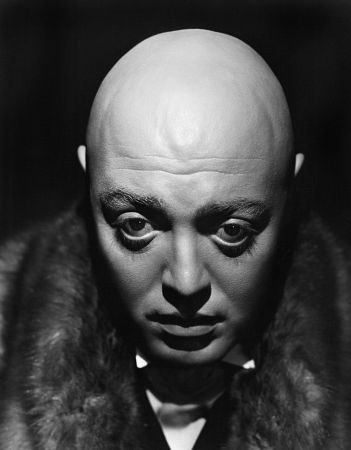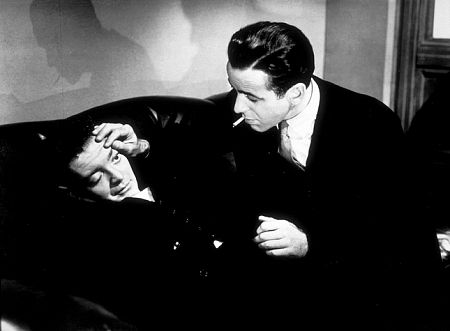The Joker
Peter Lorre
When I think of Peter Lorre, I imagine that he might at any moment reach up and touch his face to check if everything is still in place. Like it might fall off, because everything on that face (which is basically small) is too big for it. His eyes, no. Not his nose, but his mouth. His face is like topsoil out of which features are not made but grow, says the gardner. They proliferate. This face can only belong to this actor, but it can equally belong to a man, to a woman or to a child. Being so typified, it could belong to anyone. And since these peculiar features that have sprouted there rarify, evaporate without consolidation, they could just as well harbor a murderer, a Nazi criminal, a murderer who is a victim or a victim who is really a murderer. A child who is at the same time a murderer of children. Children are, as everyone knows, the cruelest beings of all, because they have always been innocent and have to stay that way as long as they retain their status as child which likewise cannot be sustained on the long term. Peter Lorre is an actor with the enduring status of a child who knows Everything and likewise is guilty and innocent. A fantasy apparition, but one who has seen so much – and this Everything has so frequently left a trail on his face like neon advertising that one sleeplessly endures in a lonely hotel room, neon light, which, when switched off, so that people can sleep peacefully at least during the hour of the wolf (no one goes shopping at night anyway) leaves that face in peace till morning. Subsequently the light will wash over that face again, the actor will act and the face will be characterized again: yes, by everything. That face will sign on again when something is needed of it, when something is expected of it, but it will sign on in the limelight of a camera from whence it comes again when everything has come out. From this child murderer. One shall know everything and nothing about him.

His face will stretch his head forward, desperate, shy, brutal, demonic, ambivalent, ancient and, well, at the same time childlike. That is trite. Still, I don’t know any other actor who does it so eye-catchingly. A film often says: am I awake or am I dreaming. Peter Lorre says: both. The chemical process of framing something on film is in Peter Lorre’s case no frame up. None of his facial features can be held up or held in. Little is made of these features, barely anyone wants to make out with them. He never played the great lover, did he? These features slide away. They slip off by themselves. Thus: they are especially difficult to sustain, to frame, as they say about film. “Framing” something on celluloid, although we are the ones who ourselves get framed, gaping at the screen, when the murderer is hunted down or is himself doing the hunting. That face signs on for us, but when we reach for it, it mouths off immaturely like a child. It holds its mouth, holds onto its “fish-eyes” like Humphrey Bogart or some other famous hotshot in the plot says (because without them there would be no plot. Peter Lorre, I don’t know, always gets shoved into the plot, he doesn’t want to but he has to, otherwise everything slips up), the child is scorned because of his eyes, his mouth, is scorned by his fellow actors – unless he is pitied. That too often happens. Usually he is scorned and pitied simultaneously. Is this face so difficult to grasp because it – by feeding favorite, flavorless stereotypes (hardly another actor has been cast so stereotypically, but in so many stereotypes this face challenges the world to typecast him, but even before you’ve finished checking his type in the book of life, he’s become someone else. You can’t even tell his age, it stays the same, not even in the course of a single film because he is simultaneously ten and one hundred) – is this face so difficult to grasp because it is likewise what one sees and what looms behind it, which is to say a typeface that likewise eludes stereotyping? Peter Lorre’s face oscillates so to speak between appearance and object (purpose of this appearance), and one recognizes in the blink of an eye the purpose of the films in which Peter Lorre plays, you recognize it in his eyes, the first eyes that have ever cast a glance. A bull’s eye you try to hit. Maybe because this actor does not exist, especially since you see right away what, who he is? And so he appears, his appearance has been decided on by the director. Peter Lorre steps into view as a phenomenon for something, either as the hunter or the hunted. A third alternative is not possible. Children do not possess so many possibilities, but, as we said: this child is at the same time extremely old and knows a lot about life – even before it begins. If you watch Peter Lorre, you know immediately what’s going to happen. Either he’ll be able to flee or he’ll die. He won’t marry.

I don’t know, every time I see Peter Lorre in a film, I have the strong feeling, he didn’t have a choice whether to appear or not. Not because he had been cast for the film anyway but because I have the impression that the only alternative to his appearance is his disappearance. A disappearance that looms right behind him, a hole that sucks him up. Bogart, Jimmy Stewart, Edward G. Robinson (he’s most similar to him, but Robinson is always a person, a character, not a phenomenon), they all have an existence behind their appearances, and lead an active life. Peter Lorre, an addict his entire life, who has sucked up everything (an infant is a “sucker” but so is a beginner, a freshblooded novice) before they transmogrify him into technology, light and shadow, before they let him surface on the big screen, informs an appearance from which nothing else has survived – because only his disappearance could possibly loom behind him. Well, maybe it is addiction that lets people surface from themselves only after they have shot up or snorted or inhaled, sucked up. And these people have no choice not to shoot up, they have to, they have to, so maybe it is this very addiction of Peter Lorre’s, sucking at him, which leaves the impression that he always has to produce himself from within, to achieve an extreme degree of existence, which is the equivalent of an extreme appearance, and by appearing as if he didn’t have a choice, he exists at least on the basis of the contexts which he embodies with other characters in this or that film. He is the linchpin, even when being totally heterogeneous, that does not, that can never be fit. He’s constantly exploding out of every context, doing so by establishing one in the first place. He is the Joker. You never know if he is male or female (strange: in the “Maltese Falcon” he’s not the one who plays little Wilbur, the homosexual lover of Sydney Greenstreet, Elisha Cook jr. plays the role, someone mainly known for his gangster roles) but he is never neuter. He’s more everything than nothing. Peter Lorre looms directly behind himself, since, although skilled at transformation, he is still just one thing at all times, which is to say, someone who can be everything, this Joker, who can nevertheless unmistakably be everything and likewise be cast everywhere where there is emptiness because he not only can be everything but can play the role of all and everything, of everyone. What looms behind it all does not reveal itself, but with Lorre in particular you know that this looming presence has got to be real. Where else is this Child of Man supposed to disappear to and where else should he reappear from? For he cannot be alive, his life is like that of all addicts, a drug. He lives from artificial substances and on artificial substance. He is nothing. He is everything. He is no appearance that one might call “mere” (you rub your eyes briefly and it’s gone). His is an appearance that clearly marks the difference between apparition and revelation. By revealing himself, he is simultaneously more gone than any actor I know. Since his sex is not really defined, he is the one who speaks up in each of us and makes us aware that we have been torn out of every context, debased, yes, debased now, by not being there at all. In this respect Lorre has always played debased roles, the kinds of people you have only a remote feeling about what they might once have been, and it was certainly not more than they are now. In that respect debased is surely not the proper word, it is only proper in the sense that this appearance on the screen, no, does not contain a reproof (because it usually reflects a criminal driven by something he doesn’t know or by nothing or an over-eager psychopath, who just isn’t fast enough to journey into nothing), it proves something rather: that between what is and what appears there is a wide gap that can never be broached, by no one, except for nothing itself, which however never itself appears. It always sends the Joker so that it can be seen.

Translation: P.J. Blumenthal
12.8.2003 / 9.5.2004 / 23.10.2005
Elfriede
Jelinek: Der Joker. In: Peter Lorre - Ein Fremder im Paradies. Hrsg.
von Michael Omasta,
Brigitte Mayr, Elisabeth Streit. Zsolnay/Kino, Wien 2004. S. 105 - 109.
zur Startseite von www.elfriedejelinek.com